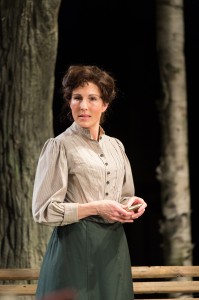
LONDON - One skips, the second muses sarcastically about life and the third moans: The “Three Sisters” are back. A brand-new Chekhov play just opened at London's Hampstead Theatre. “Longing” is the theatre sensation of this spring. And not only in London. The Chekhov-crazy Western world sees the premiere of an important new drama.
Best-selling author William Boyd (“Restless”) has woven two Chekhov short stories – “My Life” and “Visit At Friends” – into a short, fast-paced play. The Hampstead Theatre scores its second hit in one season after Rupert Everett playing Oscar Wilde in “The Judas Kiss” last autumn. “Longing” – fittingly directed by Nina Raine, the great-niece of Boris Pasternak – is sold out until April 6th.
Chekhov fans can relax. “Longing” is familiar territory. It’s almost as if we ourselves come to visit Anton Pavlovich at his dacha outside Moscow. Shortly after we have been introduced to the “Three Sisters”, an energetic nouveau-riche businessman and his vulgar daughter appear on stage. It’s like sitting under the branches in the “Cherry Orchard”. The main theme comes from Chekhov's “Seagull”: everyone is in love but always with the wrong person. Maybe “Longing” lacks the depth which makes the real difference between Chekhov’s plays and his short stories. The evening in North London can feel a bit like a Chekhov medley, or like drinking “Diet Chekhov”.
But Boyd hits the right tones with almost unbearable ease: “Everything passes”, one of the characters, Kolya, says – summer, love and beauty; and what comes next is the decline of order, society and the old, safe economic environment.
In certain ways “Longing” proves more Chekhovian than Chekhov. The stage setting is simply perfect. Even the grass has the light green, almost pale colour of Russian dacha grass after a long winter. (Only the coloured lanterns in the second part look more like “Habitat” than Russian countryside) But all in all, the North London dacha looks as if Chekhov’s characters have lived there for the past century. The actors are brilliant. Especially Tamsin Greig as the lonely, smart doctor Varya, who almost takes her life into her own hands. Almost.
When the lights go out on the stage dacha, three questions come to mind: Would Anton Chekhov have liked this play? Will the Russians accept this English “takeover”? And who will get the rights to this new Chekhov sensation in Moscow?


